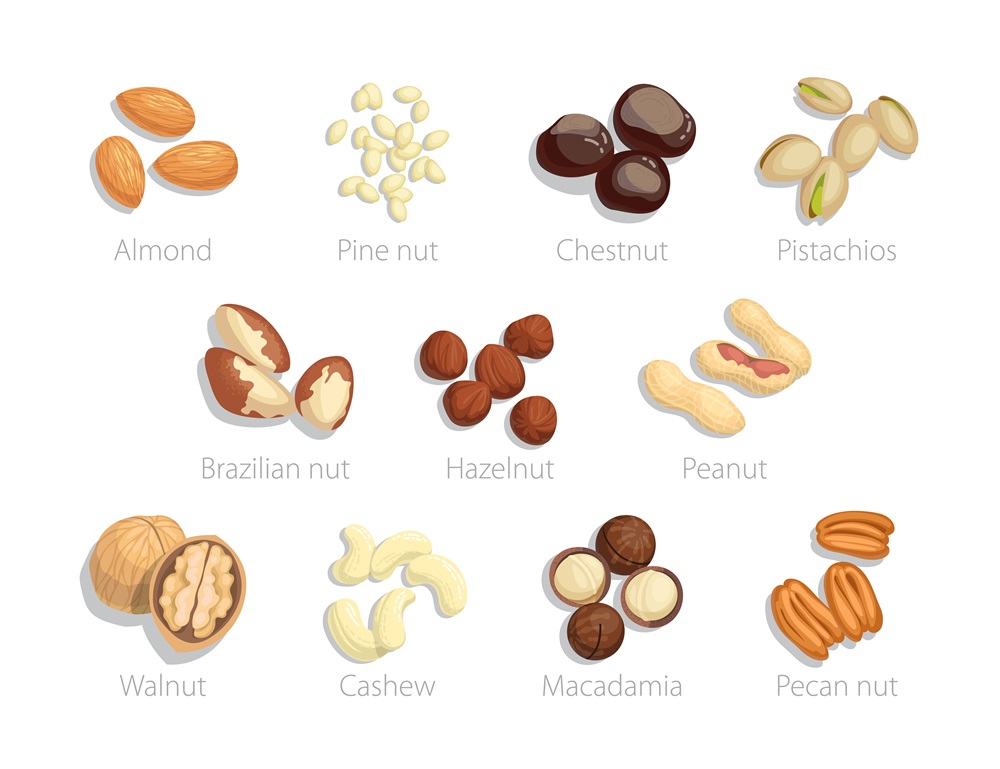Nuts for dogs is a debated topic that has captured the interest of pet owners and four-legged lovers. This topic fueled curiosity about the compatibility of these human treats with the canine diet. In a world full of varied culinary options, dog owners are always looking for essential information to ensure proper nutrition for their loyal companions.
But when it comes to nuts, the line between delicious and dangerous can seem thin. Thus, in this article, we aim to take a closer look at the question: “Are nuts for dogs a safe treat or a nutritional trap?”
CONTENT:
- Types of nuts
- Benefits of nuts for dog’s nutrition
- Nuts for dogs: Which type can they eat?
- Nuts for dogs: Which type are forbidden?
Types of nuts
There is an impressive variety of types of nuts, each with distinct characteristics and specific nutritional value. Here is a list of some of the more common types of nuts:
- Cashew nuts (Anacardium occidentale): These nuts come from the fruit of the cashew tree and are prized for their rich taste and crunchy texture. They are also a good source of copper, magnesium and phosphorus.
- Hazelnuts (Corylus avellana): Hazelnuts are known for their woody shell and core rich in protein, healthy fats and vitamins. They are often eaten both raw and fried.
- Pecans (Carya illinoinensis): Native to North America, pecans have a sweet and creamy taste. They are a rich source of healthy fats, vitamin E and antioxidants.
- Macadamia Nuts (Macadamia integrifolia): Known for their rich and creamy taste, macadamia nuts are often used in the pastry industry. They are, however, extremely high in fat, and excessive consumption can lead to digestive problems.
- Brazil nuts (Bertholletia excelsa): These large, hard nuts come from the Amazon rainforest and are rich in selenium, an essential mineral for body health.
- Almond Nuts (Prunus dulcis): Almonds are known for their high content of protein, fiber and vitamins such as vitamin E. They can be eaten raw or roasted and are often used in various recipes.
- Black walnuts (Juglans nigra): Black walnuts come from the black walnut tree and have a distinct taste. They are a good source of omega-3 fatty acids and antioxidants.
This is just a small selection from the diverse world of nuts. Each type of nut has unique characteristics and nutritional benefits, and how they are consumed can influence their impact on health.

Benefits of nuts for dog’s nutrition
Nuts can provide some benefits in a dog’s diet when offered in moderation. However, it is important to keep in mind the type of nuts and stick to the appropriate amounts. Here are some potential benefits of walnuts in a dog’s diet:
- Omega-3 fatty acids: Certain types of nuts, such as walnuts or pecans, contain omega-3 fatty acids. These fatty acids are essential for skin and coat health, helping to keep your dog’s coat looking healthy.
- Protein and essential nutrients: Nuts can provide dogs with an additional source of protein, healthy fats, vitamins and minerals. These nutrients contribute to the overall health of dogs and can make a valuable addition to their diet.
- Antioxidants: Some nuts contain antioxidants that can help protect cells from oxidative stress. These substances can help maintain overall health and prevent chronic conditions.
- Fiber: Nuts can also provide a source of fiber, which can be beneficial for dogs’ digestive systems. Fiber helps maintain gut health and can help prevent digestive problems.
- Caloric intake: Although it must be managed carefully, offering nuts can add extra caloric intake to a dog’s diet, which can be useful for active dogs or those that require a higher caloric intake.
It is important to note that not all types of nuts are safe for dogs. Macadamia nuts, for example, are known to be toxic to dogs and can cause severe health problems. Before introducing nuts into your dog’s diet, it is always recommended to consult a veterinarian to ensure that the choice is appropriate and in the correct amounts for your dog’s breed and health.

Nuts for dogs: Which type can they eat?
Not all types of nuts are safe for dogs, and some can even be toxic to them. It is important to know the types of nuts that can be safely given to dogs. Here are some types of nuts that are generally considered safe for canine consumption:
- Hazelnuts: Raw and unripe hazelnuts can be offered in small quantities as they are a good source of protein, healthy fats and vitamins.
- Almonds (unroasted and unroasted): Raw and unroasted almonds, offered in moderation, can be a source of protein and fat. Avoid salted almonds or added flavors.
- Peanuts (without salt or harmful additives): A good source of protein and healthy fats, peanuts can provide energy and support your dog’s muscular system.
- Brazil Nuts: These nuts are rich in selenium and can be offered in small amounts. Make sure they are not moldy, as mold can be toxic.
- Cashews: Contains healthy fats, protein and minerals. They can contribute to the maintenance of healthy skin and the functioning of the nervous system.
- Coconuts: Rich in healthy fatty acids and fiber, coconuts can support your dog’s skin and coat health.
It is important to note that nuts should only be a supplement in your dog’s diet and not a significant part of it. Additionally, nuts should be offered in small amounts to avoid potential digestive problems or excess calories.
Nuts for dogs: Which type are forbidden?
There are several types of peanuts and tree nuts that are considered toxic to dogs and should be avoided altogether. Here are some of them:
- Macadamia Nuts: These nuts are known to be extremely toxic to dogs. Consuming even a small amount can lead to symptoms such as vomiting, weakness, difficulty coordinating and even hypothermia.
- Black walnuts: Other types of nuts, such as black walnuts, contain chemicals that can cause stomach and gastrointestinal irritation in dogs.
- Pili nuts: Pili nuts (Canarium ovatum) can cause poisoning in dogs. They are native to Asia and the Pacific and can cause nausea and vomiting in pets.
It is important to note that, in general, any nuts that are salted, spiced or coated with artificial flavors should be avoided, as these additions can be harmful to dogs’ health.
If there is any doubt about the safety of a particular type of nut for your dog, it is always best to seek the advice of your veterinarian. Nut poisoning can lead to serious health problems, and prompt treatment is essential to protect your pet’s well-being.

